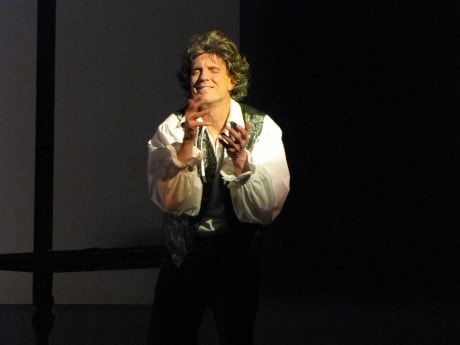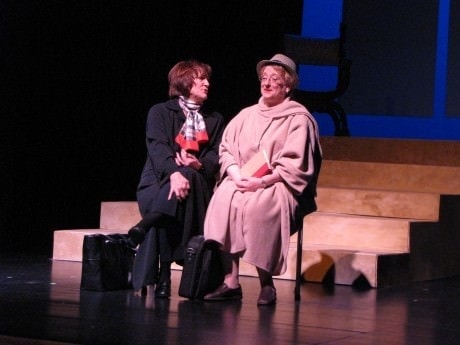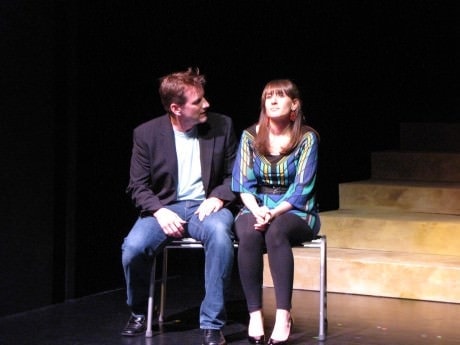Starting with the play itself, there is a whole lot to like about 33 Variations, an intricately delightful play written by Moisés Kaufman and directed by Sue Pinkman, currently being staged by Reston Community Players.

While the play runs long at 3 hours with intermission, one must consider that that Beethoven’s Diabelli Variations, which serve as its backdrop, run roughly 86 minutes in and of themselves. Moisés’ play is a written work of variations on a theme, involving the parallel and intertwining stories of people whose lives span more than 200 years. Like Beethoven, Moisés tells his story with both poignancy and humor, and like Beethoven’s masterpiece, his story is not done until it is done.
In 1819, a Viennese composer by the name of Anton Diabelli came up with a novel idea to build his growing music publishing business. His idea was that he would use his connections to solicit 50 of the greatest composers in the Austrian empire and ask that they compose a single variation on a theme from a simple waltz that he himself had composed, and that he would compile and publish these variations for distribution as a set. Among the composers he approached were the likes of Schubert, Hummell, Kalkbrenner, Mozart’s son Wolfgang, Liszt, Carl Czemy (a student of Beethoven), and Beethoven himself.
As much of the world knows, Beethoven was a guy who marched to his own drummer. He agreed to the Diabelli project, but at fifty years of age, plagued by increasing loss of hearing, and with huge projects in development that included his masterwork Missa solemnis and several sonatas, he was more than stretched for time. While he certainly could have composed a single variation almost in his sleep, Beethoven was not feeling a single variation, and so his contribution was not completed until he finished his 33rd variation four long years later. Popularly known as the Diabelli Variations, 33 Veränderungen über einen Walzer von Diabelli, Opus 120, along with Bach’s Goldberg Variations, is considered to be at the pinnacle of variation form and one of the greatest piano works ever composed.
Moisés tells his story through the eyes, hearts, and souls of Beethoven (Allen McRae), of Dr. Katherine Brandt (Mary-Anne Sullivan), a musicologist who has devoted her life to the study of Beethoven, and in particular the Diabelli Variations, and her daughter Clara (Arianne Warner). At their sides are Anton Schindler (Richard Bird), Beethoven’s personal assistant, music publisher and sometimes composer Anton Diabelli (Mario Font), music archivist Gertrude (Gayle Nichols-Grimes), and nurse Mike (Kevin Walker).

All of the actors are well cast in this production, and all of them do wonderful character work. Especially noteworthy is Gayle Nichols-Grimes, who shows great range in her role as Beethoven’s crusty, devoted, and protective archivist, Katherine’s true friend, and a pseudo family therapist to both Katherine and Clara.
Both Mary-Anne Sullivan (Katherine) and Allen McRae (Beethoven) turn in solid performances, and both do an excellent job of demonstrating the reality of debilitating emotional and physical challenges while focusing on the characters’ desire to live and exist despite of and in front of their illnesses. McRae, aided by a well-written script, brought out Beethoven’s consistent and well documented sense of humor, a trait that is too often ignored or overshadowed by darker aspects of his personality that are better known.
The parallels and variations penned by Kaufman are wonderful and seemingly never ending, clearly beginning with the character of Katherine, who shares much in common with Beethoven. Challenged by the debilitating effects of ALS, emotionally unable to appropriately express her love for her daughter Clara, and ill at ease with people and interpersonal relations in general, she is driven by her career and obsessed with using the limited life she has left to travel from her home in the U.S. to Bonn, Germany in search of an answer to a question that has consumed her life. Why did Beethoven, who many consider the greatest composer in history, spend four years of his life writing 33 variations on a theme from a simple little waltz composed by Anton Diabelli?
It was very interesting to experience the stories and subplots unfolding through the eyes of the supporting characters in this play, in particular witnessing the similarities between Schindler, who cares for Beethoven’s professional and personal needs, to the devoted archivist Gertrude, who becomes a friend and source of emotional support and growth for Katherine, and Mike, who grows in his own life journey as he cares for Katherine professionally while simultaneously helping Clara, with whom he is falling in love, process her relationship with her mother. The stories and relationships, like Beethoven’s variations, uncover the common threads of life and humanity layer by layer. Everything connects, and there is always purpose, truth, and humor.
Understanding that community theatre productions do what they do despite less than ideal budget related challenges, from a technical perspective Reston Community Players is to be commended for this excellent production. With the exception of a new wig for Diabelli, and some minor adjustments to minimize visual distraction with moving prop settings, the backstage crew earns very high marks, including sound by William ‘Shaggy’ Chrapcynski, lighting design by Franklin Colman, excellent costuming by Kathy Dunlap, outstanding sets by Kevin King, and fabulous special effects and projection design by Jon Roberts.

It would be very difficult to tell the story of 33 Variations without the variations. Music is front and center in this performance, with pianist Hilary Van Wagenen seated center stage at a grand piano throughout the show. Hillary, who earned her DMA at Catholic University and who has performed in Russia, Italy, France, Germany, and the United States, is integral to the production. Her performance Saturday evening earned a well-deserved spontaneous ovation.
Whether you are a musician or not, and whether you are familiar with Beethoven or not, this is a really great show, full of humor, and a lesson that life goes on despite the obstacles and challenges faced by those who live it. Go see it!
Running Time: Two Hours and 30 minutes plus one intermission.
33 Variations plays through May 11, 2013 at Reston Community Center – 2310 Colts Neck Road, in Reston, Virginia. For tickets, call the box office (703) 475-4500, or purchase them online.
LINK
Listen to Diabelli Variations:
33 Variations on a Waltz by Anton Diabelli, Op. 120 (1819-23)
[33 Veränderungen über einen Walzer von Diabelli, Opus 120]
Composer: Ludwig van Beethoven (1770-1827)
Pianist: Grigory Sokolov
Tema: Vivace [0:10]
Variation 1: Alla marcia maestoso [1:10]
Variation 2: Poco allegro [3:38]
Variation 3: L’istesso tempo [4:33]
Variation 4: Un poco più vivace [6:26]
Variation 5: Allegro vivace [7:52]
Variation 6: Allegro ma non troppo e serioso [9:07]
Variation 7: Un poco più allegro [10:51]
Variation 8: Poco vivace [11:58]
Variation 9: Allegro pesante e risoluto [13:40]
Variation 10: Presto [16:00]
Variation 11: Allegretto [16:32]
Variation 12: Un poco più moto [17:52]
Variation 13: Vivace [18:41]
Variation 14: Grave e maestoso [19:54]
Variation 15: Presto scherzando [24:24]
Variation 16: Allegro [25:02]
Variation 17 [26:02]
Variation 18: Poco moderato [26:59]
Variation 19: Presto [28:58]
Variation 20: Andante [29:45]
Variation 21: Allegro con brio [32:24]
Variation 22: Allegro molto alla “Notte e giorno faticar” di Mozart [33:46]
Variation 23: Allegro assai [34:31]
Variation 24: Fughetta. Andante [35:28]
Variation 25: Allegro [38:37]
Variation 26 [39:38]
Variation 27: Vivace [40:51]
Variation 28: Allegro [41:48]
Variation 29: Adagio ma non troppo [42:42]
Variation 30: Andante, sempre cantabile [43:57]
Variation 31: Largo, molto espressivo [46:01]
Variation 32: Fuga. Allegro [51:42]
Variation 33: Tempo di Minuetto moderato (aber nicht schleppend) [55:17]






Bravo! Standing ovation from me and my friend, you were perfect! A total enjoyment to watch even so the seriousness of the disease is terrible. I loved everything, the actors, the stage design, the pianist, the costumes. Tell all your friends this play should not be missed. Congratulations to the whole cast, very, very impressive! It should be shown in the Kennedy Center